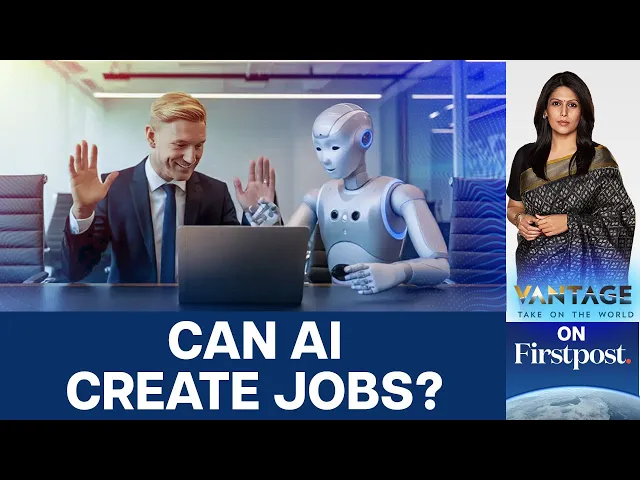Lost Your Job to AI? Here’s How to Stay Ahead | Vantage with Palki Sharma

Job security in the age of AI
In the rapidly evolving landscape of artificial intelligence, workers across industries face an existential question: will AI take my job? Palki Sharma's video tackles this pressing concern, exploring how AI is reshaping employment while offering perspective on how humans can adapt and thrive. Understanding this technological shift isn't just about survival—it's about reimagining our relationship with work itself.
Key insights from the discussion:
- AI is transforming jobs across sectors—from traditional manufacturing to creative and knowledge work—but typically augments rather than completely replaces human workers
- The technology creates a "barbell effect" in employment: eliminating middle-skilled jobs while creating opportunities at both ends of the skill spectrum
- Adaptation requires developing distinctly human skills that AI cannot easily replicate: creativity, emotional intelligence, ethical judgment, and complex problem-solving
The human advantage in an AI world
The most compelling insight from Sharma's analysis is that our most "human" attributes remain our greatest competitive advantage. While AI excels at processing vast amounts of data and identifying patterns, it fundamentally lacks human intuition, ethical reasoning, and emotional intelligence. This creates a clear pathway for workers: lean into skills that machines cannot easily replicate.
This matters tremendously in our current economic context. As companies rapidly deploy AI solutions to cut costs and boost productivity, the market increasingly rewards those who can work alongside these systems while providing uniquely human value. The workers who thrive won't be those fighting against automation but those who position themselves at the intersection of technological capability and human insight.
Beyond the video: The nuanced reality of AI adoption
What Sharma's analysis doesn't fully explore is how unevenly AI adoption is occurring across different industries and regions. In healthcare, for instance, AI tools are transforming diagnostic processes but implementation varies dramatically between large urban hospitals and rural clinics. A radiologist in a major medical center might already work alongside AI tools that flag potential issues in scans, while their counterpart in a small-town practice might still rely entirely on human expertise.
This uneven adoption creates both challenges and opportunities. Workers in rapidly transforming sectors face more immediate pressure to adapt, but also gain early experience with human-AI collaboration that may prove valuable across industries. Meanwhile, those in sectors with slower AI integration have more time to prepare but risk falling behind on crucial skills
Recent Videos
How To Earn MONEY With Images (No Bullsh*t)
Smart earnings from your image collection In today's digital economy, passive income streams have become increasingly accessible to creators with various skill sets. A recent YouTube video cuts through the hype to explore legitimate ways photographers, designers, and even casual smartphone users can monetize their image collections. The strategies outlined don't rely on unrealistic promises or complicated schemes—instead, they focus on established marketplaces with proven revenue potential for image creators. Key Points Stock photography platforms like Shutterstock, Adobe Stock, and Getty Images remain viable income sources when you understand their specific requirements and optimize your submissions accordingly. Specialized marketplaces focusing...
Oct 3, 2025New SHAPE SHIFTING AI Robot Is Freaking People Out
Liquid robots will change everything In the quiet labs of Carnegie Mellon University, scientists have created something that feels plucked from science fiction—a magnetic slime robot that can transform between liquid and solid states, slipping through tight spaces before reassembling on the other side. This technology, showcased in a recent YouTube video, represents a significant leap beyond traditional robotics into a realm where machines mimic not just animal movements, but their fundamental physical properties. While the internet might be buzzing with dystopian concerns about "shape-shifting terminators," the reality offers far more promising applications that could revolutionize medicine, rescue operations, and...
Oct 3, 2025How To Do Homeless AI Tiktok Trend (Tiktok Homeless AI Tutorial)
AI homeless trend raises ethical concerns In an era where social media trends evolve faster than we can comprehend them, TikTok's "homeless AI" trend has sparked both creative engagement and serious ethical questions. The trend, which involves using AI to transform ordinary photos into images depicting homelessness, has rapidly gained traction across the platform, with creators eagerly jumping on board to showcase their digital transformations. While the technical process is relatively straightforward, the implications of digitally "becoming homeless" for entertainment deserve careful consideration. The video tutorial provides a step-by-step guide on creating these AI-generated images, explaining how users can transform...
